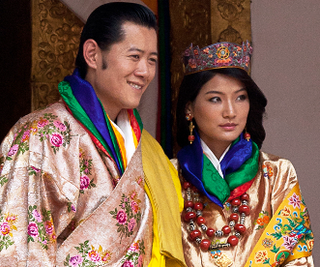
Thimphu is the capital and largest city of Bhutan. It is situated in the western central part of Bhutan, and the surrounding valley is one of Bhutan's dzongkhags, the Thimphu District. The ancient capital city of Punakha was replaced as capital by Thimphu in 1955, and in 1961 Thimphu was declared as the capital of the Kingdom of Bhutan by the 3rd Druk Gyalpo Jigme Dorji Wangchuck.

Druk Tsenden is the national anthem of Bhutan. Adopted in 1953, the lyrics were written by Dolop Droep Namgay and possibly translated into English by Dasho Gyaldun Thinley. The accompanying music was composed by Aku Tongmi.

Jigme Singye Wangchuck is a member of the House of Wangchuck who was the king of Bhutan from 1972 until his abdication in favour of his eldest son, Jigme Khesar Namgyel Wangchuck, in 2006.

Jigme Dorji Wangchuck was the 3rd Druk Gyalpo of Bhutan.

Lhuntse District is one of the 20 dzongkhag (districts) comprising Bhutan. It consists of 2506 households. Located in the northeast, Lhuntse is one of the least developed dzhongkhags of Bhutan. There are few roads, the first gas station was opened in September 2005, electricity is not well distributed, and the difficult terrain makes distribution of social welfare problematic. Despite its favourable climate, farming is hindered by the lack of infrastructure.

Zhabdrung was a title used when referring to or addressing great lamas in Tibet, particularly those who held a hereditary lineage. In Bhutan the title almost always refers to Ngawang Namgyal (1594–1651), the founder of the Bhutanese state, or one of his successive reincarnations.
Zhungdra is one of two main styles of traditional Bhutanese folk music, the other being bödra. Arising in the 17th century, zhungdra is an entirely endemic Bhutanese style associated with the folk music of the central valleys of Paro, Thimphu, and Punakha, the heart of the Ngalop cultural area. Bödra, in contrast, evolved out of Tibetan court music.

Jigme Khesar Namgyel Wangchuck is Druk Gyalpo or "Dragon King" of the Kingdom of Bhutan. After his father Jigme Singye Wangchuck abdicated the throne in his favour, he became the monarch on 9 December 2006. A public coronation ceremony was held on 1 November 2008, a year that marked 100 years of monarchy in Bhutan.

Lesbian, gay, bisexual and transgender (LGBT) people in Bhutan may face legal challenges not faced by non-LGBT people. Same-sex sexual activity was decriminalised on 17 February 2021.
Public holidays in Bhutan consist of both national holidays and local festivals or tshechus. While national holidays are observed throughout Bhutan, tsechus are only observed in their areas. Bhutan uses its own calendar, a variant of the lunisolar Tibetan calendar. Because it is a lunisolar calendar, dates of some national holidays and most tshechus change from year to year. For example, the new year, Losar, generally falls between February and March.

Desi Jigme Namgyal of Bhutan is a forefather of the Wangchuck Dynasty. He served as 48th Druk Desi of Bhutan (1870–1873), and held the hereditary post of 10th Penlop of Trongsa. He was called the Black Ruler.

Bathpalathang Airport is a domestic Bhutanese airport in Jakar (Bjakar), Bumthang District. One of only four airports in the country, it opened on 17 December 2011 with flights to Paro. The airport suspended operations in July 2012 due to runway damage, but it has since reopened to limited service.

The wedding of Jigme Khesar Namgyel Wangchuck, King of Bhutan, and Jetsun Pema took place on 13 October 2011 at the Punakha Dzong in Punakha, Bhutan. The current King of Bhutan, Jigme Khesar Namgyel Wangchuck, married Jetsun Pema, who became Queen Ashi Jetsun Pema Wangchuck. Both are descendants of the 48th Druk Desi of Bhutan and 10th Penlop of Trongsa, Jigme Namgyal.
Dechen Pem is a Bhutanese singer. She started singing in 1994 and had an album produced through Norling Drayang.
A patag, also known as patang, is a type of Asian sword characterized as having a straight single-edged blade. Patags are traditionally produced in Bhutan.
Honeygiver Among the Dogs is a 2016 Bhutanese mystery film directed by Dechen Roder. It was screened in the Panorama section of the 67th Berlin International Film Festival.
Dorji is a Tibetan and Bhutanese given name and surname.
Tashi Chhozom is a Bhutanese lawyer and jurist who became the first woman appointed to the country's Supreme Court in 2012.
Ashi Tashi Chodzom Dorji is a much-loved figure in Bhutan, having played a significant role in modern history, international relations and cultural life.
Amu Tshewang Lham was a vocalist from Tshangkha, Trongsa Bhutan. She was among the selected in a group by the Third Bhutanese King, Jigme Dorji Wangchuck, who is also known as Druk Gyalpo, to go and record the first ever traditional music album of Bhutanese culture; in the year 1968 in Calcutta, India. Among the selected were: Bhutan's most famous female vocalist at the time, 'Aum Thinlem' and 'Aum Dawpey' a famous Bhutanese lute instrument player who was the only one to be rewarded the 'Thugesy' by the king whom Aum Tshewang served for four years.










